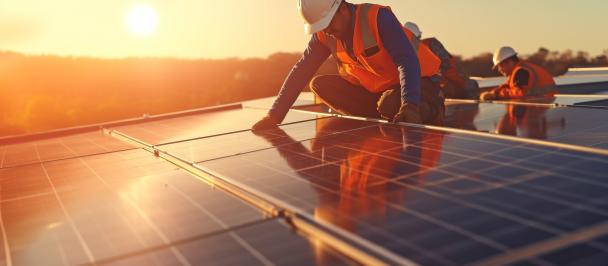
Left to right: school principle Mr. Robert Solomon, Member of Parliament for East Are'are constituency, Hon. Junior Peter Kenilorea, SPIRES project manager Ms. Judith Reynolds, MMERE Permanent Secretary Dr. Chris Vehe and UNDP Programme Manager Ms. Vini Talai.
Honiara, Solomon Islands – Access to energy in Solomon Islands is a widespread issue. Supply is unreliable and cost unaffordable for most of the population. In rural areas this is an even greater issue, with access almost non-existent. However, a recent initiative by the Stimulating Progress towards Improved Rural Electrification in Solomon Islands (SPIRES) project has set a shining example of how renewable energy can revolutionize communities.
Spearheaded by the United Nations Development Programme (UNDP) and implemented by the Ministry of Mines, Energy and Rural Electrification (MMERE) and the Ministry of Environment, Climate Change, Disaster Management and Meteorology (MECDM), the SPIRES project is paving the way for a brighter and more sustainable future for the energy in the Pacific nation.
The Dawn of Change: Rokera Provincial Secondary School
A very sunny day in October, the Rokera Provincial Secondary School in East Are’are, Southern Malaita, witnessed a transformative event. The inauguration of a 36kWp solar hybrid photovoltaic (PV) power system marked the first step towards releasing the school from diesel-generated power. The event was organized to coincide with the school's graduation – bringing together officials, school staff, students, parents and guardians, and people from nearby villages. All united to celebrate this milestone that promises 24-hour access to a more affordable and sustainable energy source.
Hon. Junior Peter Kenilorea, Member of Parliament for East Are’are, eloquently encapsulated the essence of this monumental occasion, highlighting the profound impact of education and electricity on the development of the society. The school principal, expressing heartfelt gratitude, emphasized the significance of this initiative in reducing energy costs for the school, allowing more investments in education at the same time as curbing greenhouse gas emissions.
A more brilliant future: Hunanawa Community
The following day, the light of transformation extended beyond Rokera, reaching the Hunanawa community, also in East Are’are. The installation of a 30kWp solar PV system, accompanied by a battery bank, now illuminates the lives of over a hundred households – 50 of them nestled within the heart of Hunanawa but also reaching the surroundings.
Beyond providing electricity, the SPIRES project brings a model for a more sustainable future. By reducing the dependence on fossil fuels, the project is making significant strides in mitigating the adverse effects of climate change in Solomon Islands, one of the most vulnerable countries to global warming and the climate crisis. Moreover, the emphasis on community involvement in the maintenance and sustainability of the system underscores the holistic approach adopted by the project.

The project promises 24-hour access to a more affordable and sustainable energy source.
A National Strategy in the Making
As Dr. Chris Vehe, Permanent Secretary from the Ministry of Mines, Energy and Rural Electrification (MMERE) suggested, this pilot paves the way for the renewable energy policy encompassing the entirety of the Solomon Islands. It is expected that the Rokera and Hunanawa project sites will serve as the blueprint for a comprehensive national strategy. Furthermore, the project's inclusive approach, focusing on the empowerment of women and youth, embodies a visionary step towards a more sustainable development in the country.
A Beacon of Hope
The success of the SPIRES project stands as a beacon of hope for the Solomon Islands. As UNDP Programme Manager Ms. Vini Talai summarized, “Villagers will now be able to use electricity to stimulate economic growth in their communities through increasing production of goods by switching from using manual tools to electric equipment. For example, women can increase garment production with the use of electric sewing machines and sell the surplus for income.”
Beyond the immediate benefits of electricity, the project promises an economic upsurge, an education renaissance, and a greener, more sustainable future. As the nation steps into a brighter tomorrow, the echoes of this project will resound in the efforts towards the renewable energy policy, highlighting the vital role of community participation and the inclusion of marginalized voices in shaping a more equitable and sustainable future for Solomon Islanders.
The SPIRES project is being implemented by the Ministry of Mines, Energy and Rural Electrification under its Energy Division with financial support from the Global Environmental Facility through the United Nations Development Programme. In addition, for this component, both institutions have partners with the Ministry of Environment, Climate Change, Disaster Management and Meteorology.
For more information or media inquiries please contact:
Jeanine Gadepeta - Communications, Monitoring and Evaluation Officer, SPIRES Project jgadepeta@spires.gov.sb, +677 7464457.

 Locations
Locations


